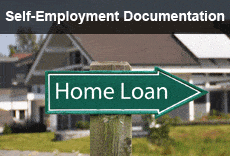 When you are self-employed, qualifying for a mortgage can be more challenging since more documentation may be needed. The reason for this is that there are some facets of being self-employed and verifying self-employed income that that banks consider to be higher risk.
When you are self-employed, qualifying for a mortgage can be more challenging since more documentation may be needed. The reason for this is that there are some facets of being self-employed and verifying self-employed income that that banks consider to be higher risk.
Since it is true that individuals with salaried jobs are also at risk of losing them at any time, there is no such thing as a totally secure borrower, but being self employed does have a few documentation requirements.
Self-Employed Documentation Requirements
There are a number of things that you will likely need as a self-employed individual. These items will vary depending on the lender and program:
- Proof of income / tax returns for the first 2-3 years your business has been operating
- 3 or more months of bank statements
- Proof of assets / reserves
- Letter from CPA / Your business registration details to support the existence of a business for 2 or more years
- Income statement for your business
Self-Employed Income Calculation
Be aware that your lender may choose to take an average of your first 2-3 years in business and not use your actual income today to calculate your approval amount.
If you have made substantial business deductions against your tax returns, bring additional documentation or mortgage lenders may look at your net income only. You want to do what you can to prove the true extent of your income if it is required to get the kind of mortgage you want.
If you are self-employed and the sole income earner in your family, with an understanding of the process, you can ensure that you get yourself a mortgage and step onto the first rung of the property ladder. Many lenders do offer special mortgages for the self-employed that can allow you to work around the traditional system so your entrepreneurial nature does not hold you back. Looking into these options can also help you with the process.



About The Author: Kenneth Le
More posts by Kenneth Le